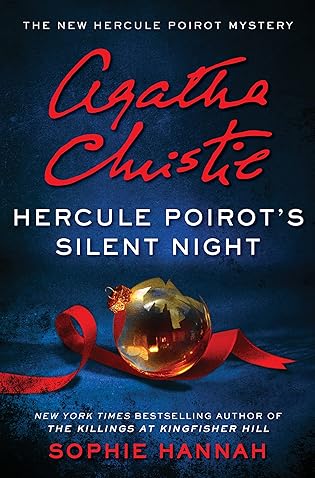 Hercule Poirot's Silent Night (New Hercule Poirot Mysteries, #5) by Sophie Hannah
Hercule Poirot's Silent Night (New Hercule Poirot Mysteries, #5) by Sophie Hannah Format: eARC
Source: supplied by publisher via Edelweiss
Formats available: hardcover, paperback, ebook, audiobook
Genres: historical mystery, mystery
Series: New Hercule Poirot #5
Pages: 384
Published by William Morrow on October 24, 2023
Purchasing Info: Author's Website, Publisher's Website, Amazon, Barnes & Noble, Kobo, Bookshop.org, Better World Books
Goodreads
The world’s greatest detective, Hercule Poirot – legendary star of Agatha Christie’s Murder on the Orient Express, Death on the Nile and A Haunting in Venice – puts his little grey cells to work solving a baffling Christmas mystery.
CAN HERCULE POIROT SOLVE A BAFFLING MURDER MYSTERY IN TIME FOR CHRISTMAS?
It’s 19 December 1931. Hercule Poirot and Inspector Edward Catchpool are called to investigate the murder of a man in the apparent safe haven of a Norfolk hospital ward. Catchpool’s mother, the irrepressible Cynthia, insists that Poirot stays in a crumbling mansion by the coast, so that they can all be together for the festive period while Poirot solves the case. Cynthia’s friend Arnold is soon to be admitted to that same hospital and his wife is convinced he will be the killer’s next victim, though she refuses to explain why.
Poirot has less than a week to solve the crime and prevent more murders, if he is to escape from this nightmare scenario and get home in time for Christmas. Meanwhile, someone else – someone utterly ruthless – also has ideas about what ought to happen to Hercule Poirot . . .
My Review:
 Scotland Yard Inspector Edward Catchpool and his friend and mentor Hercule Poirot are just settling in to a two-week staycation (even if that term had not been invented yet) in London, staying in Poirot’s rather palatial apartment at Whitehaven Mansions, attended by Poirot’s inestimable butler, George, for the duration of the holidays.
Scotland Yard Inspector Edward Catchpool and his friend and mentor Hercule Poirot are just settling in to a two-week staycation (even if that term had not been invented yet) in London, staying in Poirot’s rather palatial apartment at Whitehaven Mansions, attended by Poirot’s inestimable butler, George, for the duration of the holidays.
Catchpool, in particular, was determined to spend his Christmas hols with his friend Poirot and absolutely NOT with his mother, the overbearing Cynthia Catchpool. The moment Cynthia lies her way into Poirot’s office, we understand EXACTLY why Catchpool intended to spend his holidays as far away from his mother as he could manage.
Because Cynthia Catchpool is the perfect example of another term that hadn’t been invented yet. She was a ‘helicopter parent’ long before that term was even on the horizon, someone who swoops into her son’s life – or frankly anyone’s life – and absolutely does not listen to a single thing she has to say.
She is determined that Catchpool and Poirot will return with her to the blustery Norfolk coast in late December to solve a murder and spend Christmas with her and the friends she’s visiting,and will not take ‘NO’ for an answer, no matter how many times it’s shouted at her.
But when she describes the circumstances of the murder to Poirot, Catchpool knows instantly that he is at least somewhat doomed. Christmas itself may be saved, but Poirot gets a look in his eye that Catchpool knows all too well – that something about this case has caught the attention of Poirot’s ‘little grey cells’.
What fascinates Poirot so much that he is willing to disrupt his holiday plans? The man who has been murdered is someone who could not possibly have been intended to be murdered. So why is he dead?
Poirot must know. He must solve the case. Before the truly execrable cuisine served at Frellingsloe House causes him to die from starvation. Or poison.
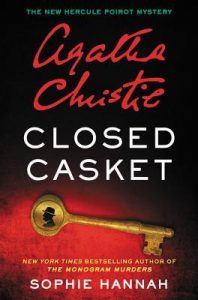 Escape Rating B-: Looking back at my reviews of the previous books in this New Hercule Poirot series by Sophie Hannah (The Monogram Murders, Closed Casket, The Mystery of Three Quarters, and The Killings at Kingfisher Hill) I’ve had mixed feelings about pretty much all the books in the series, and this latest entry is absolutely no exception.
Escape Rating B-: Looking back at my reviews of the previous books in this New Hercule Poirot series by Sophie Hannah (The Monogram Murders, Closed Casket, The Mystery of Three Quarters, and The Killings at Kingfisher Hill) I’ve had mixed feelings about pretty much all the books in the series, and this latest entry is absolutely no exception.
I’m beginning to think that the problem is that I like the concept more than the execution (ahem, pun not exactly intended but…) and that’s true in this entry in the series as well. Although I did find this one more readable than The Killings at Kingfisher Hill, I ended this book feeling every bit as sorry for Catchpool this time, if not a bit more, than I did then.
Because this time he’s very much put upon by Poirot AND his mother. Who I fully confess I hated as a character from her very first appearance to the point where I mentally cringed every time she appeared on the page. Her overbearing helicopter parenting, no matter how anachronistic that term, was a trial from beginning to end. The story did need her gossiping nature, I’m just not sure it needed her utter assholishness about it. Or at least I didn’t need it considering that she did not get nearly the bashing she deserved.
The case itself went to some interesting psychological places, as it turned out to be wrapped around the idea of reinventing oneself and how deeply one can get consumed by burying that past so completely that anything that touches on it causes a psychological break. I liked that Poirot and Catchpool had differing interpretations of those causes, particularly as Poirot’s reasoning felt more germane to the times while Catchpool’s was perhaps a bit anachronistic but more humane.
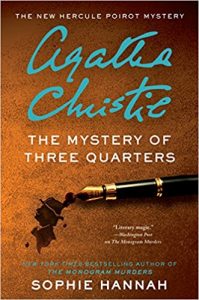 A lot of the ‘action’ of the story, particularly the ‘fair play’ aspects of the mystery and its resolution, were handled as more ‘telling’ than showing, as the two detectives were often working separately, and only caught up at irregular intervals through meticulous reports – which is how the reader gets caught up as well.
A lot of the ‘action’ of the story, particularly the ‘fair play’ aspects of the mystery and its resolution, were handled as more ‘telling’ than showing, as the two detectives were often working separately, and only caught up at irregular intervals through meticulous reports – which is how the reader gets caught up as well.
I’m left with a bag of mixed feelings about this one. I liked it better than The Killings at Kingfisher Hill, not as much as The Mystery of Three Quarters and Closed Casket, but still enjoying the concept as a whole. We’ll see how I’m feeling about the whole thing if Poirot and Catchpool catch another case a year or two from now.

 Yellowface by
Yellowface by  The Cliff's Edge (Bess Crawford #13) by
The Cliff's Edge (Bess Crawford #13) by 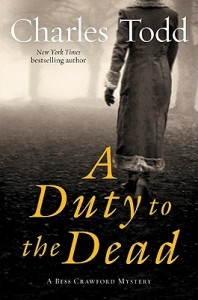 The cliff’s edge of the title is both literal and figurative in this 13th entry in the
The cliff’s edge of the title is both literal and figurative in this 13th entry in the 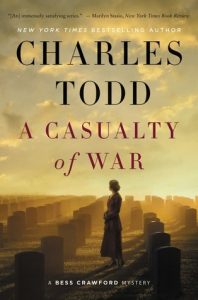 Escape Rating B-: As much as I have enjoyed this series, I believe that it is time for it to come to an end unless it makes a major change in direction. Because Bess has been in limbo for several entries now – at least since book 10,
Escape Rating B-: As much as I have enjoyed this series, I believe that it is time for it to come to an end unless it makes a major change in direction. Because Bess has been in limbo for several entries now – at least since book 10,  So Bess is in Yorkshire in the midst of this case, which is quite a muddle that doesn’t seem much clearer at its end. Not that the cause of the whole thing isn’t found, but rather that the solution isn’t terribly cathartic and doesn’t seem to resolve much of the surrounding tension.
So Bess is in Yorkshire in the midst of this case, which is quite a muddle that doesn’t seem much clearer at its end. Not that the cause of the whole thing isn’t found, but rather that the solution isn’t terribly cathartic and doesn’t seem to resolve much of the surrounding tension.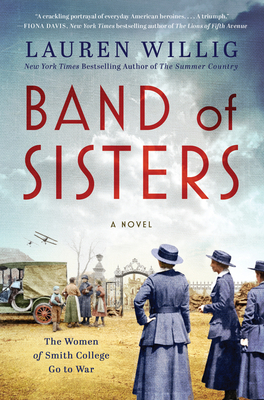 Band of Sisters by
Band of Sisters by 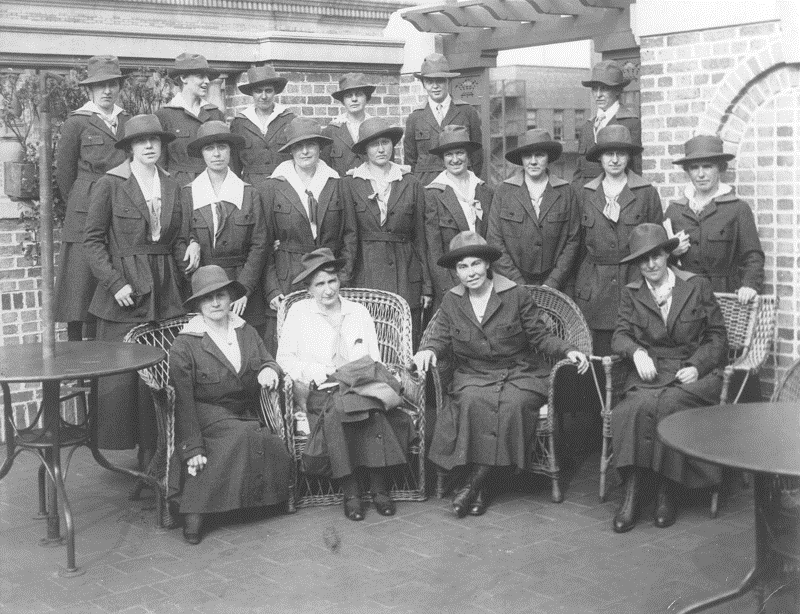
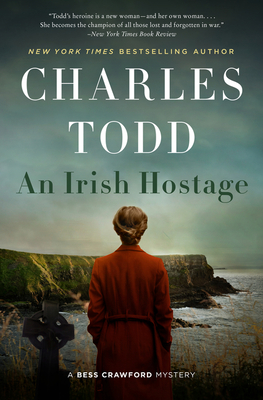 An Irish Hostage (Bess Crawford #12) by
An Irish Hostage (Bess Crawford #12) by 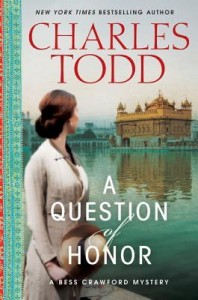 Escape Rating A-: The story in An Irish Hostage feels close and tight, and that’s probably the way it should be. There are huge issues on the horizon, and in the story, and most of them are too big for Bess to solve. She’s stuck, inside tiny, hostile Killeighbeg, caught in the web of the Flynn household, and trapped entirely too often inside her own head.
Escape Rating A-: The story in An Irish Hostage feels close and tight, and that’s probably the way it should be. There are huge issues on the horizon, and in the story, and most of them are too big for Bess to solve. She’s stuck, inside tiny, hostile Killeighbeg, caught in the web of the Flynn household, and trapped entirely too often inside her own head.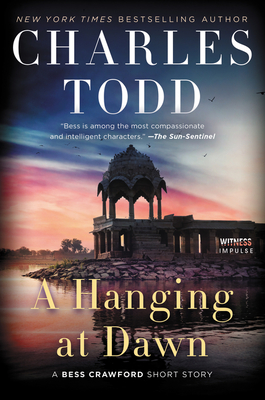 A Hanging at Dawn by
A Hanging at Dawn by 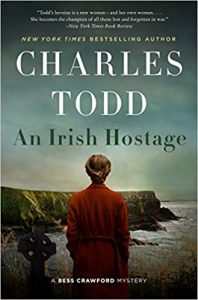 And even though, or perhaps especially because, in this particular case it’s the threat of the power of the Raj that brings justice for Simon, it’s also true that the same threat would have worked just as well if he’d been guilty. The only difference is that if he had been guilty the Crawfords would never have raised the threat in the first place.
And even though, or perhaps especially because, in this particular case it’s the threat of the power of the Raj that brings justice for Simon, it’s also true that the same threat would have worked just as well if he’d been guilty. The only difference is that if he had been guilty the Crawfords would never have raised the threat in the first place. Hench by
Hench by 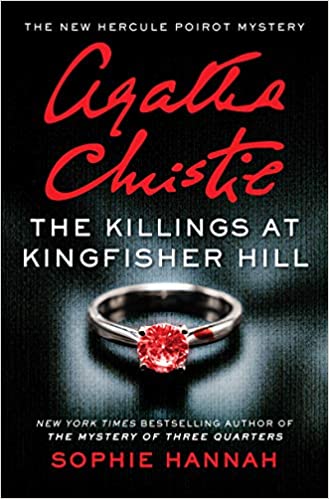 The Killings at Kingfisher Hill: The New Hercule Poirot Mystery by
The Killings at Kingfisher Hill: The New Hercule Poirot Mystery by 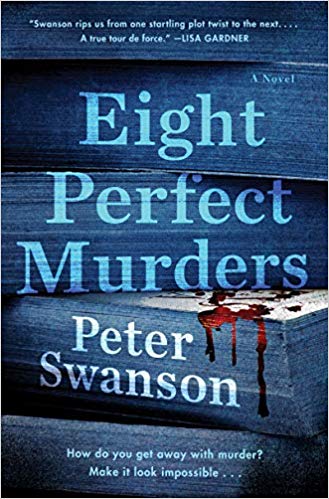 Eight Perfect Murders (Malcolm Kershaw, #1) by
Eight Perfect Murders (Malcolm Kershaw, #1) by 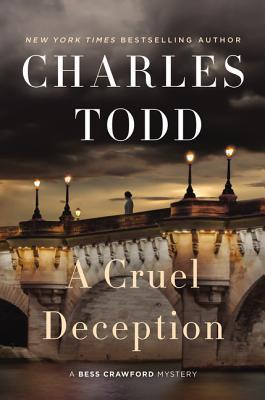 A Cruel Deception (Bess Crawford, #11) by
A Cruel Deception (Bess Crawford, #11) by  Escape Rating B: As I said at the top, this is a story about being in limbo. There are just too many things that are very much up in the air, and Bess’ investigation into Minton’s circumstances are just one of the many, many things that are hanging.
Escape Rating B: As I said at the top, this is a story about being in limbo. There are just too many things that are very much up in the air, and Bess’ investigation into Minton’s circumstances are just one of the many, many things that are hanging.